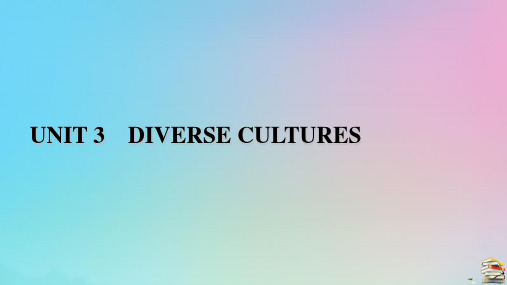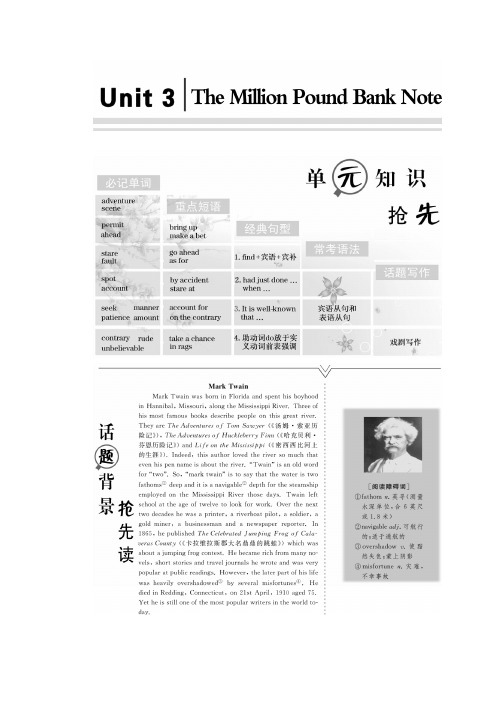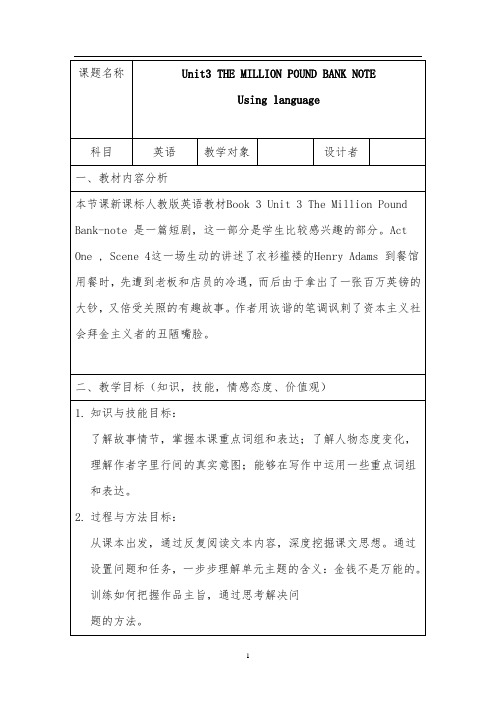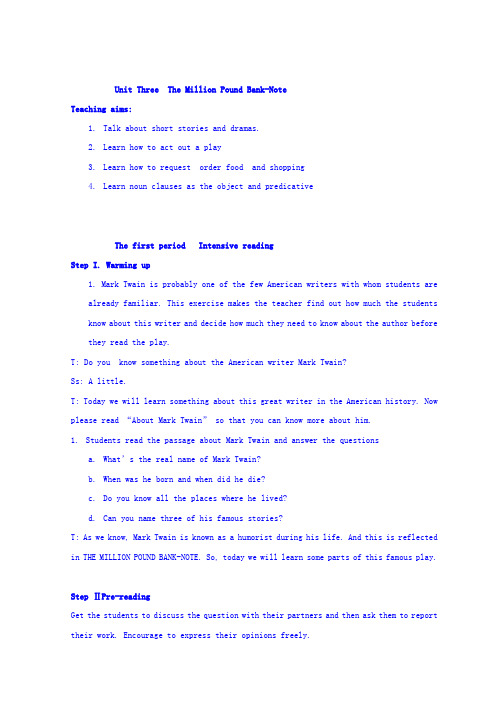人教版高中英语必修三教学案:Unit+3+Section+3.doc
- 格式:doc
- 大小:246.01 KB
- 文档页数:9


Unit 3 The Million Pound NotesTeaching aims and demands1. topic: 1) Forms of literature and art: short story and drama2) Space travel and gravity2. function: 1)Request2)Ordering food3. vocabulary: words and expressions unit 34. grammar: Noun clauses as the object and predicative Period 1 Vocabulary1. bet n. 赌;打赌v. 打赌;赌钱[典例]1) . He often bets a 1ot of money on horses.他经常在赛马上豪赌。
2) . I bet that it will rain tomorrow. 我敢肯定说明天一定会下雨。
[重点用法]bet on为某事打赌make a bet on 为某事打赌win/lose a bet 打赌赢/输了[练习]按要求翻译。
1) _________ .We _ _____ _____ 打(赌)the outcome of the next horserace.2) .他把所有的钱都用在赌马上Keys: 1). make a bet on 2). He spends all his money betting on horses.2. fault n. 缺点;错误,过错;故障vt.挑剔,指责faulty adj.有缺点的;不完善的faultless adj.不可挑剔的[典例]1). I like him despite his faults. 虽然他有种种缺点, 但我仍然喜欢他。
2). No one could fault his performance. 他的演出无懈可击。

Ⅰ.Match the word with its meaning.1.birthplace A.小说2.novel B.信封3.adventure C.出生地4.author D.奇遇;冒险5.scene E.探索;寻求6.wander F.著者;作家7.permit G.耐性;忍耐8.fault H.漫游;漫步;漂泊9.spot I.过错;缺点;故障10.seek J.发现;认出;斑点11.patience K.许可;允许;通行证;执照12.envelope L.(戏剧)一场;现场;场面;景色答案:1~5CADFL6~10HKIJE11~12GBⅡ.Write down the meaning of phrases in each sentence.1.The Smiths are praised for the way they bring up their children.抚养2.Go ahead for two blocks, then turn left.前进3.I found the key by accident when I was cleaning the room.偶然4.In the West people think it's rude to stare at a person.盯着看5.Good luck accounts for her being famous overnight.解释6.It doesn't seem ugly to me; on the contrary, I think it's rather beautiful.相反Do you know something about Mark Twain's stories? Match the following pictures to the names of his stories.1.Running for Go v ernor________2.《汤姆·索亚历险记》________3.The Million Pound Bank Note________4.《哈克贝利·费恩历险记》________5.Boat in Venice________答案:1~5ADEBCⅠ.Fast-reading1.Put the following events in correct order.①Henry wandered in London streets.②About a month ago Henry Adams was sailing out of the bay.③The next morning he was spotted by a ship.④Towards nightfall he found himself carried out to sea by a strong wind.⑤On the ship he earned his passage by working as an unpaid hand.答案:②④③⑤①2.What's the main idea of the passage?A.Two rich gentlemen made a bet on a million pound bank note. B.How did Henry Adams land in London?C.Henry Adams was puzzled about the note.D.Why did the two rich gentlemen choose Henry Adams?答案:AⅡ.Careful-readingRead the text carefully and choose the best answer.1.Henry landed in Britain ________.A.because he planned to earn a living thereB.because he lost his own shipC.by accidentD.because he wanted to wander in London2.What happened to Henry when he was sailing out of the bay?A.His boat sank in a storm at sea.B.He was carried out to sea by a strong wind.C.He was attacked by some bad men at sea.D.He jumped into the sea to kill himself.3.Which of the following words can best describe Henry?A.Brave.B.Honest.C.Lazy. D.Shy.4.Which of the following is TRUE?A.Henry opened the letter before 2 o'clock.B.The two brothers would like to offer him a job.C.Roderick believed that with a million pound bank note a man could survive a month.D.Henry only wanted a job because he was penniless in London.5.How did Henry feel when the two brothers gave him the letter?A.Unhappy. B.Surprised.C.Pleased. D.Excited.答案:1~5CBBDAⅢ.Study-readingAnalyze the following difficult sentences in the text.1.It is Henry Adams, an American businessman, who is lost in London and does not know what he should do.[句式分析][尝试翻译]他叫亨利·亚当斯,是一个美国商人。

Section ⅢDiscovering Useful Structures每/日/金/句:Since Qin Dynasty, Chinese various ethnic groups have lived together as a single nation.自秦朝以来,中国各民族就作为一个单一国家生活在一起。
语言基础集释(教材P30)I really like that paper folding book, and my son likes that paper folding book, too.我真的很喜欢那本折纸书,并且我的儿子也喜欢那本折纸书。
◎fold vt.包;裹;折叠vt. &vi.(可)折小;(可)叠平(1)fold (up) 折叠;对折fold one's arms 双臂交叉在胸前(2)unfold v. 展开(3)folding adj. 可折叠的[佳句] He folded up his umbrella as he entered the room.他进屋时把伞折了起来。
[练通]——单句语法填空①I finished my coffee, ________(fold) my newspaper and stood up.②As the mist cleared, a most beautiful view ________ (fold) before their eyes.[写美]——应用文佳句③那个年轻人双臂交叉躺在沙发上,很快就睡着了。
The young man lay on the sofa __________________and soon fell asleep.语法专项突破省略[自主感知]①And what a city (it is)—a city that was able to rebuild itself after the earthquake that occurred in 1906.②My hotel is near downtown,in the Mission District,(which is) one of the oldestparts of the city.③This district used to be a poor area of town,but (this district) is now a centre for art,music,and food.④(It is) A real mix of cultures here!⑤What great food (it is)!⑥(I) Can't wait被省略的部分为主语的是________。


Unit Three The Million Pound Bank-NoteTeaching aims:1.Talk about short stories and dramas.2.Learn how to act out a play3.Learn how to request order food and shopping4.Learn noun clauses as the object and predicativeThe first period Intensive readingStep I. Warming up1. Mark Twain is probably one of the few American writers with whom students arealready familiar. This exercise makes the teacher find out how much the students know about this writer and decide how much they need to know about the author before they read the play.T: Do you know something about the American writer Mark Twain?Ss: A little.T: Today we will learn something about this great writer in the American history. Now please read “About Mark Twain” so that you can know more abou t him.1.Students read the passage about Mark Twain and answer the questionsa.What’s the real name of Mark Twain?b.When was he born and when did he die?c.Do you know all the places where he lived?d.Can you name three of his famous stories?T: As we know, Mark Twain is known as a humorist during his life. And this is reflected in THE MILLION POUND BANK-NOTE. So, today we will learn some parts of this famous play.Step ⅡPre-readingGet the students to discuss the question with their partners and then ask them to report their work. Encourage to express their opinions freely.T: If a rich person gives you a large amount of money to use as you like, for example, one million pound, what will you do? Why?( Students have a discussion on this question. Whatever choice students make here, they should be ready to offer their classmates a good reason for it.)…T: I think all of you have a good idea. Do you want to know what happened to Henry Adams in THE MILLION POUND BANK-NOTE written by Mark Twain? Have you ever read the story? So this class we will learn the story together.Step Ⅲ While reading1.ScanningGet the students to comprehend the whole scene quickly and accurately and meanwhile help them form a good habit of reading. Give the students some time to read through the scenes and then answer some questionsa.How did Henry Adams come to England?b.Where did Henry work before? How much did he have?c.What did the two gentlemen give Henry?d.When can Henry open the letter.2.After the students discuss the questions and then check the answers with the wholeclass.T: Listen to the tape and try to find out the characteristics of the whole passage. Ss: This is part of a play. So, the narration is written in the present tense.T: OK. All of you have done a good job. Next, let’s rea d the scene again and do some exercises.Step Ⅳ Post-readingDo comprehending exercises and explain :a.He was brought up in Hannibal ,Missouri, along the Mississippi River.1) bring sb up : (esp passive ) raise or educate sbeg : After his parents died ,John was brought up by his elder sisterand brother –in –law.2) bring sth up : call attention to sth ,raise stheg ; It seems that nobody wants to bring up the matter for discussion.b.Two old and wealthy brothers , Roderick and Oliver ,have made a bet .Bet :1) an agreement to risk money on the result of a race ,game etc or on somethinghappening ,or the money that you riskLet’s make a bet on the next election.2) to risk money on the result of race, game , competition ,or otherfuture eventMrs Black spent all her money betting on horse races.3) make a bet: make an arrangement to risk money, etc. on an event of which the resultis doubtful.c. a large amount of: a large quantity of; a great deal ofe.g. They bought a large amount of furniture before they moved their new house.d.permit sb to do something: allow somebody to do somethinge.g. My mother doesn’t permit me to ride in the street after it rained.e.by accident: as a result of chancee.g. I only found it by accident.f.stare at: look at somebody or something with the eyes wide open in a fixed gaze( inastonishment, wonder, fear, etc)g.to be honest: to tell you the truth; to be franke.g. To be honest, I don’t think we have a chance of winning.Step Ⅴ Homework1.Review the key sentences in this part2.Preview the words in the second period.3.Act out the play in groupsThe second period: ActingStep I ActingT: Are you ready to act out the play in class?Ss: Yes.T: Good. Let’s welcome the first group and the second group ,please get prepared. …T: Class, we should pay attention to some examples of Mark Twain’s humor in this scene, which will help us better understand the play and act it out more appropriately. Do you agree with me?Ss: Yes, of course.Step II HomeworkReview what we learned in this unitThe Third period Watching the movie The Million Pound Banknote精美句子1、善思则能“从无字句处读书”。
高中英语人教版必修3Unit3全单元教案设计Unit 3The Million Pound Bank Note单元规划类别课程标准要求掌握的项目话题Forms of literature and art: short story and drama; how to act out a play词汇birthplacen.出生地; 故乡Embassy n. 大使馆; 大使及其官员phrasen.短语; 词组; 惯用语Seek vt. & vi. 寻找; 探索; 寻求adventure n. 奇遇; 冒险patience n. 耐性; 忍耐novel n.小说; 长篇故事adj. 新奇的; 异常的contrary n. 反面; 对立面adj. 相反的;相违的authorn.著者; 作家Envelope n. 信封scenen.(戏剧)一场; 现场; 场面;景色Permit vt. & vi. 许可; 允许; 准许n. 通行证; 许可证; 执照wander vi. 漫游; 漫步; 漂泊steak n. 肉块; 鱼排; 牛排pavement n. 人行道pineapple n. 菠萝businessman n. 商人dessert n. 餐后甜点unbelievable adj. 难以置信的amount n. 数量aheadad v. 在前; 向前; 提前rude adj. 粗鲁的; 无礼的bayn.海湾mannern.礼貌; 举止; 方式stare vi. 凝视; 盯着看scream vi. 尖声叫n. 尖叫声; 喊叫声fault n. 过错; 缺点; 故障genuine adj. 真的; 真诚的bow vi. & n. 鞠躬; 弯腰rag n. 破布; 碎布passage n. 船费; 通道; (一)段indeed adv. 真正地; 确实; 实在account vt. & vi. 认为; 说明; 总计有n. 说明; 理由; 计算;账目spot vt. 发现; 认出n. 斑点; 污点;地点短语bring up抚养; 培养; 教育; 提出in rags衣衫褴褛go ahead 前进; (用于祈使句)可以; 往下说as for关于; 至于by accident偶然; 无意中; 不小心do with对待; 处理; 处置stare at盯着看; 凝视make a bet打赌account for导致; 做出解释be lost迷路; 倾心于某事on the contrary与此相反; 正相反permit sb. to do sth. 准许某人做某事take a chance冒风险; 碰运气in a. . . manner以……的举止(态度)重要句型1. Young man, would you step inside a moment, please? (request)2. I wonder, Mr. Adams, if you’d mind us asking a few questions. (I wonder if. . . )3. . . . I found myself carried out to sea by a strong wind. (find+O. +O. C. )4. And it was the ship that brought you to England. (it is/was. . . that. . . )5. The fact is that I earned my passage by working as an unpaid hand. . . (noun clause as thepredicative)6. You mustn’t think we don’t care about you. (double negative)7. That’s why we’ve given you the letter. (noun clause asthe predicative)8. Well, why don’t you explain what this is all about?(suggestion; noun clause as the object)功能 1. RequestWould you please come in?Could you offer me some kind of work?Would you mind waiting just a few minutes?I wonder, Mr. Adams, if you mind us asking a few questions? May I ask you how much money you have?—Well, to be honest, I have none.—Go right ahead.2. Ordering foodI’d like some ham and eggs and a nice big steak.I’ll have a nice long glass of beer.3. Shopping语法 1. Noun clauses as the objectI can’t say that I have any plans.. . . and he does not know what he should do.。
[语法初识]1.概念:在主从复合句中充当宾语的从句,叫做宾语从句。
它可以充当句中谓语动词、介词或形容词的宾语,有时也作非谓语动词的宾语。
2.连接词的用法(1)that 引导的宾语从句I think (that ) you should turn to the teacher for help.我认为你应该向老师寻求帮助。
I am afraid (that ) I've made a mistake.恐怕我已经犯了一个错误。
The Swede stood quite still, except that his lips moved slightly.那个瑞典人站着一动不动,只是嘴唇还微微在动。
He said (that) you were too young to understand the matter and that you were asked not to care about it.他说你太年轻,还无法理解这件事情,你也不要去管它。
[点津]that引导的宾语从句有时可作间接宾语。
She told me that she would accept my invitation.她对我说她会接受我的邀请。
即时演练1翻译句子(用that引导的宾语从句)①我听说他参军了。
(join)I_heard_that_he_had_joined_the_army._②他告诉我们在整个工作中,他们都会帮忙的。
(through)He_told_us_that_they_would_help_us_through_the_whole_work.③我对他一无所知,只知道他是南方人。
(except)I_know_nothing_about_him_except_that_he_is_from_the_south._(2)whether或if 引导的宾语从句whether或if引导宾语从句时,在句中不充当成分,但是含“是否”之意,从句要用陈述语序。
interest, the teacher can hold a competition among them.教学重点1. Develop students’ reading and speaking skills.2. Let students read and act the play.3. Have students learn to use the expressions t o order food.教学难点1. Enable students to learn to use reading strategies such as skimming, scanning, and so on.2. Get students to act the play.3. Have students make a dialogue at the restaurant.三维目标知识与技能目标1. Get students to learn some useful new words and expressions in this part.2. Get students to read the play.3. Let students learn the expressions of ordering food.过程与方法目标1. Develop students’ reading skills and enable them to learn how to use different reading strategies to read different reading materials.2. Enable student s to understand and act out the play.3. Have students learn how to use the expressions to order food.情感态度与价值观目标1. Stimulate students’ interests of learning English by reading and acting this play.2. Develop students’ sense of group cooperation and teamwork.四、教学方法Problems probing method. Work in groupsMake a quiz for the students to find out how much they already know about Mark Twain, Ask students to answer questions by groups. The questions are as follows:1.What was the real name of Mark Twain?2.What was his job?3.Can you name one of his famous novels?五、教学过程→Step 1 Revision1. Check the homework exercises.2. Ask some students to read the words of U3.→Step 2 Warming up1. Ask students to make a list of all the changes that Henry has made to his life.2. Have them in pairs discuss what difference they think this will make to the way people treat him and report their ideas to the class.3. Learn more about Mark Twain. Then list some popular novels such as The Adventures of TomSawyer, The Prince and the Pauper. [百度知道]→Step 3 Brief introduction of The million pound note[百度知道]Step 4 listen to the tape1. Ask the all turn to Page 17. We are going to listen to ActⅠ, Scene 3.2. Let them listen carefully and write down the main idea.3. Play the tape again to check and have the correct answers.→Step 5 Reading and speaking task1. Ask students to discuss the following questions in pairs.1) Where did Henry come from?2) Why was Henry in London?3) What happened to Henry?→Step5 See the movie [百度知道]Let a group retell the story and start a role play.→Step 6 Think overDo you know the exchange rate between pound and RMB?[百度知道]→Step 6 Homework1. Finish the Workbook exercises.2. Review the contents of the unit and complete Summing Up on Page 24.六、教学反思这篇课文很有挖掘、开发的价值,通过the waiter和老板的语言、动作、神态等描写,细致刻画出两个市井人物的见钱眼开、惟利是图的丑恶嘴脸。
Unit 3 Diverse Cultures-Reading and ThinkingObjectives:To improve students’ reading comprehension skills.To expand students’ vocabulary related to cultural diversity.To develop students’ critical thinking skills through discussions.Materials:Reading passage about cultural diversity.Vocabulary list related to cultural diversity.Comprehension questions about the reading passage.Discussion questions about cultural diversity.Procedure:Vocabulary:Introduce new vocabulary related to cultural diversity. Provide definitions and examples of usage. Have students create sentences using the new vocabulary.Reading:Encourage students to read for comprehension and take notes on important details.Comprehension Questions:Create a set of comprehension questions related to the reading passage. Ask students to answer the questions individually or in pairs. This will help to further reinforce their understanding of the reading.Discussion Questions:Create a set of discussion questions related to cultural diversity. Ask students to discuss the questions in small groups or as a class. This will help to develop their critical thinking skills and encourage them to share their opinions and experiences.Example discussion questions:Why is it important to learn about different cultures?Have you ever experienced a culture shock? What was it like?What are some benefits of cultural diversity?Are there any negative effects of cultural diversity? If so, what are they?How can we promote cultural understanding and respect in our daily lives?Homework:Assign homework related to cultural diversity. This could include researching a different cultural tradition, interviewing someone from a different culture, or watching a documentary or movie about a different culture.。
Section_ⅢGrammar—宾语从句和表语从句语法图解探究发现①Oliver believes that with a million pound bank note a man could survive a month in London.②It is Henry Adams, an American businessman, who is lost in London and does not know what he should do.③I wonder, Mr.Adams,if you'd mind us asking a few questions.④I didn't know whether I could survive until morning.⑤That's why we've given you the letter.⑥It looks as if it is going to rain.[我的发现](1)以上6个句子中的黑体部分都是主句中的从句,这些从句在词性上相当于一个名词,故被称作名词性从句。
(2)①②③④中的黑体部分属于宾语从句。
(3)⑤⑥中的黑体部分属于表语从句。
一、名词性从句1.概念:在主从复合句中,相当于名词的从句被称为名词性从句。
2.分类:名词性从句包括:主语从句、宾语从句、表语从句和同位语从句。
3.连接词4.注意事项(1)名词性从句要用陈述语序; (2)主从句的时态要基本呼应,有时需用虚拟语气;(3)注意某些连接词的特殊用法(见后)。
[即时演练1] 用适当的连接词填空①I am proud of what I did. But I was just helping to do what he should do.②I don 't know if/whether he still lives here after so many years.③Could you tell me how I could apply for the scholarship?④Do you know who won the game?⑤You may depend on it that I shall keep my word.⑥China is no longer what she used to be.二、宾语从句1.概念:在主从复合句中充当宾语的从句,叫作宾语从句。
它可以充当句中谓语动词、介词或形容词的宾语,有时也作非谓语动词的宾语。
2.连接词的用法(1)that 引导的宾语从句用法⎩⎪⎪⎨⎪⎪⎧ ①无意义 ②不充当成分省略情况⎩⎪⎨⎪⎧ 省略⎩⎪⎨⎪⎧ ①作动词或形容词的宾语②有两个that 引导的宾语从句时, 前一个从句中的that 可以省略不省略⎩⎪⎨⎪⎧ ①介词后宾语从句引导词that ②有两个that 引导的宾语从句时,后一从句中的that 不省略I am afraid (that) I've made a mistake.恐怕我已经犯了一个错误。
He said (that) you were too young to understand the matter and that you were asked not to care about it.他说你太年轻,还无法理解这件事情,你也不要去管它。
[名师点津]that引导的宾语从句有时可作间接宾语。
She told me that she would accept my invitation.她对我说她会接受我的邀请。
(2)whether或if引导的宾语从句whether或if引导宾语从句时,在句中不充当成分,但是含“是否”之意,从句要用陈述语序。
I wonder whether/if we'll finish the task on time.我不知道我们能否按时完成这项任务。
I'll see whether/if I can advise him to accept it.我要看看我是否能劝他接受。
[名师点津]用whether而不用if引导宾语从句的情况:①作介词的宾语时,只能用whether;②与or或or not连用时只能用whether;③用于There's some doubt whether ...句型中;④少数动词如:leave, put, discuss, doubt等后的宾语从句常用whether。
We are talking about whether we admit students into our club.我们正在讨论是否让学生加入我们的俱乐部。
I want to know whether it's good news or not.我想知道是否是好消息。
We discussed whether we should use the money to buy a new house.我们讨论了是否该用这笔钱来买套新房子。
There is some doubt whether he will come in time.他是否能及时赶到值得怀疑。
(3)连接代词和连接副词引导的宾语从句连接代词who, whom, whose, what, which, whatever, whoever, whomever, whichever和连接副词when, where, how, why。
这些连接词都有词义,除引导从句外,还在从句中充当一定的成分,可作主语、宾语、表语、定语、状语等。
这种宾语从句有疑问意义,但不是疑问句,不能用疑问语序,而要用陈述语序。
She always thinks of how she can work well.她总是在想怎样把工作做好。
(how作状语)She gave up what she was doing.她放弃了她正在做的事情。
(what作宾语)Do you know who has won Red Alert game?你知道是谁赢得了红色警戒的游戏吗?(who作主语)Do you know when the meeting will begin?你知道什么时候开会吗?(when作状语)Can I speak to whoever is in charge of this project?我能和负责这个项目的人谈谈吗?(whoever作主语)[名师点津]“疑问词-ever”结构的词可以引导名词性从句和让步状语从句,而“no matter +疑问词”结构只能引导让步状语从句。
[辨析比较]what和which引导宾语从句的区别They wanted to see which shop would offer the best service. (他们要看好几家商店)他们想看看哪家商店提供的服务最好。
They wanted to see what shop he opened last week.(他们想知道他所开的那个商店的类型) 他们想看看他上一周开的是什么商店。
3.注意事项(1)it作形式宾语当某些动词后的宾语从句之后有宾语补足语(通常是形容词或名词)时,通常以it代替that宾语从句作形式宾语,这时that不可省略。
常见的这类动词有find, think,consider, take, feel等。
I think it necessary that we take plenty of hot water every day.我认为我们每天多喝开水是有必要的。
We find it difficult that we should finish the work on time.我们发现我们按时完成工作有困难。
[名师点津]在like, enjoy, love, hate 等表“喜怒哀乐”的动词或一些特殊动词(短语)如take, depend on, rely on, see to等后若要跟宾语从句,需跟形式宾语it。
I hate it when they say with their mouths full of food.我讨厌他们满嘴食物时说话。
You may depend on it that they will support you.你相信好了,他们会支持你的。
(2)宾语从句的否定转移当主句的主语是第一人称,谓语动词是think, believe, suppose, imagine, expect等表示“认为、相信、猜测”等意义的动词,其后接宾语从句时,若从句表示否定意义,则常把否定词not转移到主句谓语部分。
I don't think(that) he is interested in that thing.我认为他对那件事不感兴趣.I don't believe she has finished the homework, has she?我想她还没有写完作业,是吗?(3)宾语从句的虚拟语气表示“建议、命令、要求、决定、主张”等动词后的宾语从句要使用虚拟语气,即“should +动词原形”,其中should可以省略。
这类动词主要有insist, order, demand等。
He insisted that all of us should be there on time by any means.他坚持要我们大家想尽办法按时去那儿。
[巧学助记]后接宾语从句常用虚拟语气的动词口诀:“一二三四”一个坚持(insist);两个命令(order, command);三条建议(advise, suggest, recommend);四项要求(demand, desire, require, request)。
[即时演练2](1)用适当的连接代词或连接副词填空①We are discussing what we shall do to help the poor.②Journal writers write about their travels in what is called a travel journal.③I wonder how you are getting on with your studies.④I want to know where she has gone.⑤Can you help to find out whose wallet it is?⑥I don't know whether/if he'll arrive in time.(2)单句语法填空①I worry about whether I hurt her feelings.②He insisted that the meeting (should)_be_put (put) off.③I like it that everyone passed the exam.④The teacher said that the sun rises (rise) in the east.⑤I know that he studied (study) English last term.⑥He felt it his duty that he should help the old man.三、表语从句1.概念:在主从复合句中充当表语的从句,叫作表语从句。